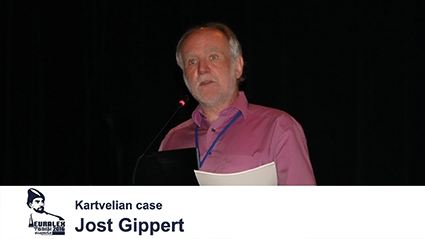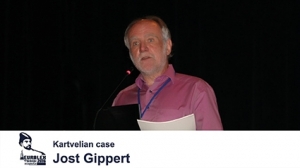Of Bread, Circus & German Professors: Disinformation in Georgia
It takes very little to wind a Georgian up. If you ask one, they’ll say it’s because they are fiercely proud people (and they are), while others might speak coyly about things like small nation syndrome being at the heart of the matter. Be that as it may, trying to belittle Georgia and Georgians has become a viable tool of disinformation over recent years, with powers that be ably using it to elicit aggression, negativity or nihilism in society. What transpired last week was a particularly nasty piece of fake news as it covered all three of those sentiments. But first things first.
On March 2, a Facebook post published by popular photographer Goga Chanadiri went viral in the Georgian social media bubble. The post told of a comment that well-respected German professor, linguist and Caucasus scholar Jost Gippert (of Frankfurt University) purportedly made of the Georgian nation:
“Georgians are a culturally unwholesome nation. They have a natural urge towards being slaves of other, bigger nations. And this manifests in everything. For example, a nation that has its own language and three unique alphabets to its name resorts to, even after gaining independence, indicating the roads in a foreign language. I have witnessed such phenomena only in the nations of the former colonies, such as India and countries of Africa.”
Needless to say, people weren’t impressed with this. A torrent of abuse was rained on the poor professor’s head, some going as far as to demand he not be allowed in the country anymore. And yet, perhaps not so surprisingly, there were some who agreed with the sentiment, including Chanadiri himself. Online media (presa.ge, geotimes.ge, progressnews.ge, for.ge – the latter notorious for its far-right, pro-Russian reporting), seeing the post going viral, wasted little time in publishing it as separate articles, giving the piece even greater exposure. And while one might be skeptical of things posted on Facebook, being published by an official media outlet lends it a greater degree of veracity. Thus, bread and circuses were enjoyed. That is, until Act II came through: Professor Gippert vehemently denied he had ever uttered anything of the sort and threatened legal action against those who had disseminated the false information.
Questions were asked, with watchdog media like Mediachecker and Myth Detector taking it upon themselves to expose the falsehood. Media outlets pointed a finger towards Chanadiri as a source, while the latter attributed it to one Paata Vardanashvili, who owns and runs a travel agency. When asked where the info had come from, Vardanashvili mentioned a close confidant who wanted to remain anonymous and declined to answer further questions.
On March 12, in another bid to clear Gippert’s name, a press conference was held in the National Library of Georgia, attended by Gippert’s numerous Georgian colleagues, all eager to speak out on behalf of him. A student of Gippert, Mariam Kamarauli, was kind enough to facilitate direct contact with the professor, with whom GEORGIA TODAY conducted a brief yet concise interview to sum up the whole story.
You denied the statement came from you. Any idea where it might have originated?
No. I do not use Facebook or any other social media, so I did not even see that fake information myself: I was informed by colleagues who had read it and who forwarded me some screenshots. I have no idea who is behind it.
What’s your own take on the statement?
This is not just a hoax but an attempt to undermine my reputation and to cast me in a negative light via defamation, and I am not ready to let this calumny pass by without legal consequences.
Whose interests do you think all this might have served?
Again, I have no idea. If there are political intentions involved, I do not know any person or group of persons in Georgia that might be interested in abusing me for their purposes.
And finally, what would your message be to Georgians?
My attitude towards Georgia, the Georgian people, their language and their culture is manifest in several books and quite a lot articles. I think there is no further need to prove that that fake information is absurd.
By Vazha Tavberidze












